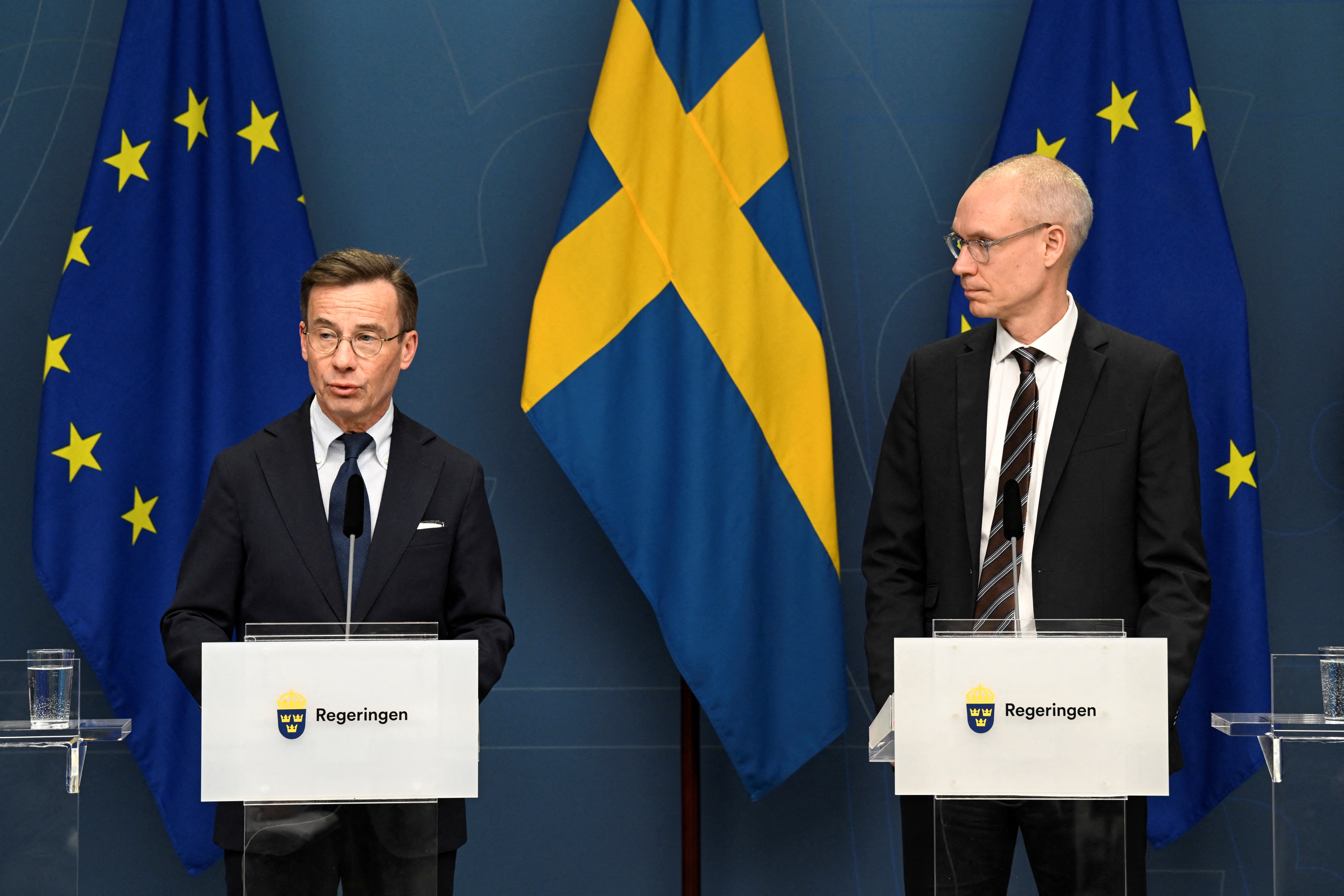By: sam doak
July 27 2023
Sweden accuses Russia of weaponizing disinformation in the wake of Quran burnings

Image source: Fredrik Sandberg/Reuters
On July 26, 2023, Swedish Prime Minister Ulf Kristersson shared a post on Instagram, claiming his country had become the target of a coordinated Russian disinformation campaign.
Addressing his 148,000 followers, Kristersson warned, “Sweden is currently exposed to influence campaigns supported by states and state-like actors, whose very purpose is to harm Sweden and Swedish interests.” Sweden’s Minister for Civil Defence, Carl-Oskar Bohlin, elaborated further on the nature of this threat in a statement issued on Twitter, claiming, “Russia-backed actors are amplifying incorrect statements such as that the Swedish state is behind the desecration of holy scriptures.”
While the Swedish government has not elaborated on potential responses to Russian activity in this space, Kristersson reassured his followers, “The government is now working hard to push back the incorrect image that is being spread of Sweden, here and in other countries.”
Rising tensions
Kristersson’s statement comes after weeks of heightened tensions elicited by the public burning of a Quran in Stockholm. This act was carried out in front of a mosque by Salwan Momika, an activist who later staged a similar action outside the city’s Iraqi embassy.
Unsurprisingly, Momika’s actions provoked an intense backlash worldwide. In the weeks since the burning of the holy text, protests have occurred in Muslim-majority countries, and state representatives have publicly called on the Swedish government to prevent repeat incidents. While the Swedish government has publicly condemned the actions of Momika, rising tensions have led to violent scenes, culminating in protestors storming Sweden’s embassy in Baghdad.
The global backlash has been partly fueled by the circulation of false and misleading narratives concerning events in Sweden. As Logically Facts has previously covered, many of these narratives concern the state’s role in these events. Frequently, social media users falsely claimed that Momika obtaining permission for his protest meant that he enjoyed the support of the state. The claim that Swedish law only allows for the burning of Islamic religious texts also gained significant traction, despite having no basis in fact.
As the response to Momika’s actions gained momentum across much of the Muslim-majority world, social media users added to the increasing tensions by sharing misattributed footage purportedly showing increasingly intense responses. As Logically Facts covered at the time, this included the sharing of an old video of a Swedish flag being hit by a rocket and footage of an unrelated riot that occurred in 2022.
Outrage on the global stage has had tangible effects. Of significance are the potential complications for Sweden’s efforts to join NATO. While most members of the alliance were quick to express their approval for the country’s ascension, it was not until July 11 that Turkey’s President, Recep Erdogan, agreed to support the country’s application. While President Erdogan has not rescinded his support, which is essential if Sweden’s effort is to be successful, he has been a vocal critic of the country in the wake of Momika’s actions, publicly stating, “We will teach the arrogant Western people that it is not freedom of expression to insult the sacred values of Muslims.”
Russia capitalizes on unrest
Speaking to Logically Facts, Colonel Phillip Ingram, a former senior military intelligence officer, claimed Sweden’s NATO ambitions were a likely motive for Russia choosing to leverage narratives concerning Quran burnings, stating, “Russia sees the potential to increase the friction between Sweden and its NATO membership application and Turkey by focusing on and highlighting this. It knows of Turkey's concerns and is reinforcing them.”
Russian media has frequently attempted to disseminate claims regarding Sweden’s NATO membership, including the suggestion in January that the Swedish PM had announced the possibility of deploying nuclear weapons to force NATO into pressuring Turkey on its membership. Logically Facts investigated this claim at the time, finding it to have no merit and noting that some Russian media outlets eventually retracted the claim. However, the damaging narrative was already out in the wild.
According to Colonel Ingram, leveraging narratives of this nature is a method not uncommon in Russian foreign influence operations. On this, Colonel Ingram told Logically Facts, “It is a standard Russian tactic to look for friction points and reinforce the reason for the friction in any way possible, putting the proverbial knife in the crack and wiggling it to try and make it wider.” He continued, “It is having an impact in that it is making Turkey's decision to support Sweden’s accession more difficult. However, something has happened in recent months to increase President Erdogan’s stance against Russia, as we have seen with Zelenskyy’s visit and the release of the Azov Battalion commanders.”
While the long-term impacts of disinformation concerning Quran burnings in Sweden are yet to be seen, it is clear that this event has provided an opening for actors keen to make the country’s position on the world stage more tenuous. Logically Facts has previously covered the possibility of Russian influence in a Quran-burning incident by Danish far-right provocateur Rasmus Paludan, who has ties to pro-Kremlin media figure Chang Frick.
Sweden’s security service SAPO warned of a worsening security situation in response to these controversies and Sweden’s reputation in Muslim parts of the world, although the level of alert remains at three (five being the highest) – a heightened risk.


